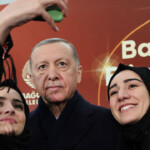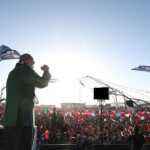A close look reveals an all-encompassing fascist politics that is based on hostility to migrants and refugees, which has been added to the structural hostility against Kurds, that is hostile to each other as much as it is hostile to these groups, that thinks it can solve every problem with violence, that is exhausted by an inferiority complex in its threadbare relationship with the world. The man to rule this sloppy crowd is in place: Recep Tayyip Erdoğan.
May 14, 2023 is a milestone about which books will be written. It was a day of turmoil for Turkey and its near and distant geography, the aftershocks of which will last for decades. A few humble observations on the evil that the coterie of “experts” shamelessly insist on labeling “Turkish democracy:”
First of all, there was no surprise, contrary to the opposition’s overconfidence. In the totalitarian drive of the post-2013 era, the the signs were read, persistently and repeatedly. Five years ago on January 13, 2018 in Ahval: “There is a widespread belief that the elections will solve all problems and bring us back to the glorious past while devastated institutions and social deprivation will be cured swiftly, like a miracle.
And there is such desperation that there are masses of people willing to vote for anyone opposing Erdoğan. As if merely opposing Erdoğan can by itself be a political agenda.
There is no talk of the century-long moral abyss since the Armenian Genocide, nor of half of the society’s fondness for fascism, nor of the non-solutions to the Kurdish problem, nor of the fact that the EU opportunity is lost forever, nor of what the new social contract should look like.
Yet we are continually told not to lose hope.
But the point is, rather than losing or not losing hope, we skip the fundamental questions and pin our hopes on elections.
The regime is pleased with the rhetoric of hope. It releases the pressure on the opposition by keeping their dreams alive, letting them hope that despite their miserable life in the end, everything will be alright.
On the other hand, those who put their hopes on the elections are unaware that they are playing by the rules of the ruler.
The AKP came with an election, but the regime will not end with an election. If it does, all the officials, beginning with the boss, will find themselves at the High Court, answering for their evil actions. That much is clear. Moreover, because of their role in the Syrian civil war, the indictment of the International Criminal Tribunal will always be a threat to them.
It is about time we woke up and started asking the fundamental questions.”
The day after the ominous June 24, 2018, when the fascist dictator was elected in the referendum for Turkey’s new system of government, again in Ahval: “The delusion that a lot of hope and an election with two votes could overcome fascism was merely a way of delaying a serious examination of how Turkish society arrived at this point in the first place.
Commentators who have difficulty accepting the election results are responsible for failing to appreciate the extent to which fascism has settled in Turkey. They give people false hope. They contribute to the depressive mood that has spread in the aftermath of the election.
Understanding the Erdoğan phenomenon and the regime he has been working to establish since years requires more than studying Erdoğan’s background, his political party, his close circles, his business relationships, Turkey’s political history, mistakes made by old elites, as well as academic classifications to define the regime. It requires understanding the masses that support his regime, those masses Hannah Arendt was microscopically studying…
Erdoğan’s followers, whom he refers to as the ‘majority,’ and the ‘glorious nation,’ harbor glaring fascist attributes. These cohesive masses stay in power through brutality and venality.
24 June 2018 proved that simply complaining about the lawlessness of the regime, while it was gradually forming a ‘new legal order’ outside the parameters of the existing one, is useless.
Of course, pointing out at the infractions to law and keeping tallies of illegal actions is of vital importance. But for years, as ‘the new legal order’ normalized previously unacceptable acts, the legal community refused to take the new system seriously. Now the leader and the regime have been forced down the country’s throat, and opinion leaders still continue to argue about the gender of the angels, as the popes did during the siege of Constantinople.
Unlike early 20th century Germany, Italy, or Russia, totalitarianism in Turkey did not result from crises that shattered society. Rather, it arose from a country that was a model nation with a promising economy and European Union ambitions.
Where Turkish totalitarianism came from and what lies at its core have yet to be studied in depth. Such studies will hopefully be conducted as fascism now spreads.
Turkey’s Erdoğan problem now encompasses half of Turkey’s population. This fact cannot be tackled with hopeful optimism, invectives, irony or sarcasm; it demands politics in the most noble sense of the word.
Will Turkey’s poor democratic credentials manage to cope with this monster, or will the entire country also go the way of the goose-step? The answer will depend on the brutality of the unavoidable collapse”
Five years later, on May 14, 2023, or May 28 if you like, and by a neat coincidence on the centennial of the country’s republic, this is exactly where we are. The collapse has intensified in all respects, and the election results show that at the end of the first round, and especially with the opposition candidate Kılıçdaroğlu’s complete reversion to his original stance, a full goose-step mode has been taken.
Except for the Kurdish Political Movement and a few crumbs from the center right and center left, the country has been turned upside down by a wave of different shades of fascism. Looking at the distribution in the new parliament, the number of deputies we can call anti-fascist is barely 100. In other words, the picture that emerged on May 14th gives us and the world a message far beyond the right-left, conservative-progressive, religious-secular divisions.
A closer look reveals an all-encompassing fascist politics that is based on hostility to migrants and refugees, which has been added to the structural hostility against Kurds, that is hostile to each other as much as it is hostile to these groups, that thinks it can solve every problem with violence, that is exhausted by an inferiority complex in its threadbare relationship with the world. The man to rule this sloppy crowd is in place: Recep Tayyip Erdoğan.
Once the election turmoil is over, he will find it almost difficult to decide between which shades of fascism to form the executive. The AKP, MHP, BBP, YRP, YRP, İYİP, GP, DSP, VP, ZP and a significant part of the CHP will be engaged in a “who is the better fascist” competition to govern the country. Their voters are about seventy percent of the population.
After May 14, the issue is not the identity of fascism’s proponents. It is about the catastrophic consequences of another huge tumor in the east of the European continent, in addition to the Russian tumor, and how to control it. Internally, for the survival of the Kurds and a handful of democrats who object, and externally for the security of the surrounding region and the wider world.


